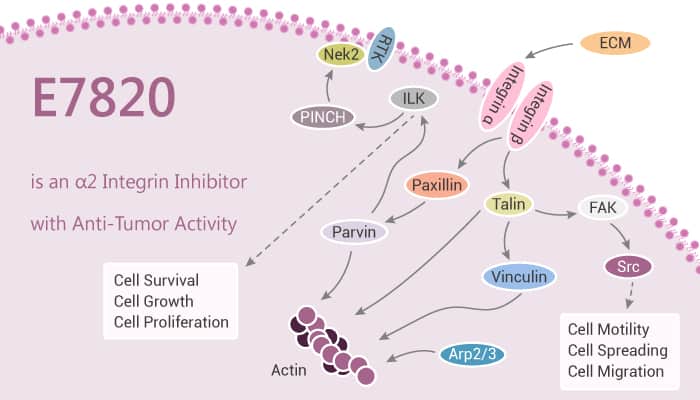Vascular endothelial growth factor (VEGF) is a prime contributor to tumor angiogenesis. Most tumor cells produce high levels of VEGF and VEGF receptors associated with tumor endothelial cells. E7820 is an aromatic sulfonamide derivative and an Angiogenesis inhibitor.

E7820 inhibits in vitro proliferation and tube formation of human umbilical vascular endothelial cell (HUVEC). Moreover, E7820 inhibits tube formation through the suppression of integrin α2. In particular, E7820 inhibits both bFGF- and VEGF-driven tube formation of HUVEC in a dose-dependent manner. E7820 treatment also inhibits the proliferation of HUVEC induced by either bFGF or VEGF in serum-free medium. The IC50s are 0.10 and 0.081 μg/mL, respectively. E7820 suppresses integrin α2 mRNA after 6 h of treatment, indicating that E7820 acts initially on integrin α2 followed by integrins α3, 5, and β1. Besides, E7820 also completely suppresses the growth of human colorectal tumor LoVo cells.
E7820 also significantly inhibits the growth of LoVo cells, an effect which was strongly suppressed by antibody against VEGF, suggesting that E7820 is effective against VEGF-dependent angiogenesis and tumor growth. Oral administration of E7820 remarkably results in inhibition of tumor-induced angiogenesis in mouse dorsal air sac model. E7820 inhibits tumor growth of human colorectal tumor cell lines in xenotransplanted model in mice. Furthermore, E7820 shows inhibition of tumor-induced angiogenesis and tumor growth in a xenotransplanted model in mice.
In summary, E7820 acts as a unique and potent angiogenesis inhibitor. This finding may provide the basis for a new approach to antiangiogenic therapy through the suppression of integrin α2 on endothelium.